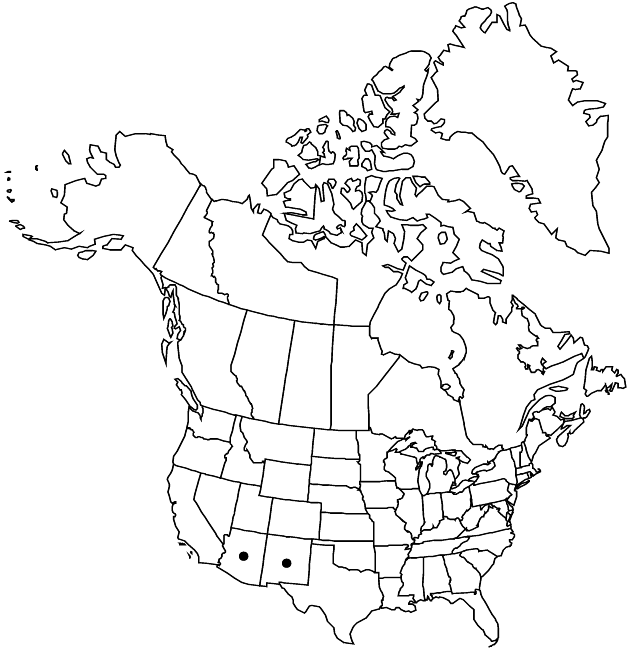Difference between revisions of "Arida riparia"
Sida 20: 1414. 2003.
FNA>Volume Importer |
imported>Volume Importer |
||
| (6 intermediate revisions by 2 users not shown) | |||
| Line 8: | Line 8: | ||
}} | }} | ||
|common_names=Chiricahua mountain tansy-aster;alkali aster | |common_names=Chiricahua mountain tansy-aster;alkali aster | ||
| − | |basionyms={{Treatment/ID/ | + | |basionyms={{Treatment/ID/Basionym |
|name=Aster riparius | |name=Aster riparius | ||
|authority=Kunth | |authority=Kunth | ||
| + | |rank=species | ||
| + | |publication_title=in A. von Humboldt et al., Nov. Gen. Sp. | ||
| + | |publication_place=4(fol.): 72. 1818; 4(qto): 92. 1820 | ||
}} | }} | ||
|synonyms={{Treatment/ID/Synonym | |synonyms={{Treatment/ID/Synonym | ||
|name=Machaeranthera riparia | |name=Machaeranthera riparia | ||
|authority=(Kunth) A. G. Jones | |authority=(Kunth) A. G. Jones | ||
| − | }}{{Treatment/ID/Synonym | + | |rank=species |
| + | }} {{Treatment/ID/Synonym | ||
|name=Machaeranthera sonorae | |name=Machaeranthera sonorae | ||
|authority=(A. Gray) Stucky | |authority=(A. Gray) Stucky | ||
| + | |rank=species | ||
}} | }} | ||
|hierarchy=Asteraceae;Asteraceae tribe Astereae;Arida;Arida riparia | |hierarchy=Asteraceae;Asteraceae tribe Astereae;Arida;Arida riparia | ||
| Line 26: | Line 31: | ||
}}<!-- | }}<!-- | ||
| − | --><span class="statement" id="st-undefined" data-properties=""><b>Annuals,</b> 25–60 cm; taproots slender to thick. <b>Stems</b> 1–12+, erect or ascending, straight and rigid, sometimes sprawling from base, branching from base and distally, glabrous, glaucous. <b>Leaves</b> mostly cauline; sessile (± appressed); blades oblanceolate, 20–30 × 3–5 mm, reduced distally, (thick, succulent) bases broadened, margins entire (incised to dentate in hybrids with A. parviflora) eciliate or with 1–8 cilia per side, apices linear, spiny-mucronate, glabrous; distal subulate, entire. <b>Heads</b> borne singly (terminal), often in loose, leafy, cymiform arrays. <b>Involucres</b> hemispheric, 10–12 × 10–16 mm (fresh). <b>Phyllaries</b> in 4–5 series, appressed, linear-lanceolate, 2–8 mm, bases whitish to tan, margins entire to laciniate, apices green, acute to acuminate, glabrous. <b>Ray</b> florets 50–80+; laminae bluish purple to lavender, 10–12 mm, coiled after flowering. <b>Disc</b> florets 45–100+; corollas yellow, 3.5–5 mm. <b>Cypselae</b> oblanceoloid, 2.5–3 mm, 11–13-nerved per face, faces sparsely sericeous; pappi: white, setose; ray 3–3.5 mm; disc 3–4 mm. <b>2n</b> = 10.</span><!-- | + | --><span class="statement" id="st-undefined" data-properties=""><b>Annuals,</b> 25–60 cm; taproots slender to thick. <b>Stems</b> 1–12+, erect or ascending, straight and rigid, sometimes sprawling from base, branching from base and distally, glabrous, glaucous. <b>Leaves</b> mostly cauline; sessile (± appressed); blades oblanceolate, 20–30 × 3–5 mm, reduced distally, (thick, succulent) bases broadened, margins entire (incised to dentate in hybrids with <i>A. parviflora</i>) eciliate or with 1–8 cilia per side, apices linear, spiny-mucronate, glabrous; distal subulate, entire. <b>Heads</b> borne singly (terminal), often in loose, leafy, cymiform arrays. <b>Involucres</b> hemispheric, 10–12 × 10–16 mm (fresh). <b>Phyllaries</b> in 4–5 series, appressed, linear-lanceolate, 2–8 mm, bases whitish to tan, margins entire to laciniate, apices green, acute to acuminate, glabrous. <b>Ray</b> florets 50–80+; laminae bluish purple to lavender, 10–12 mm, coiled after flowering. <b>Disc</b> florets 45–100+; corollas yellow, 3.5–5 mm. <b>Cypselae</b> oblanceoloid, 2.5–3 mm, 11–13-nerved per face, faces sparsely sericeous; pappi: white, setose; ray 3–3.5 mm; disc 3–4 mm. <b>2n</b> = 10.</span><!-- |
-->{{Treatment/Body | -->{{Treatment/Body | ||
| Line 33: | Line 38: | ||
|elevation=1300–1400 m | |elevation=1300–1400 m | ||
|distribution=Ariz.;N.Mex.;Mexico (Chihuahua;Coahuila;Durango;Zacatecas). | |distribution=Ariz.;N.Mex.;Mexico (Chihuahua;Coahuila;Durango;Zacatecas). | ||
| − | |discussion=<p>Arida riparia is a distinctive species recognized by its V-shaped branching, narrow, succulent, somewhat appressed, spiny-tipped leaves, and relatively large heads. It is known to hybridize with A. parviflora in southeastern Arizona and adjacent New Mexico. Specimens with dentate leaf margins usually represent hybrids.</p> | + | |discussion=<p><i>Arida riparia</i> is a distinctive species recognized by its V-shaped branching, narrow, succulent, somewhat appressed, spiny-tipped leaves, and relatively large heads. It is known to hybridize with <i>A. parviflora</i> in southeastern Arizona and adjacent New Mexico. Specimens with dentate leaf margins usually represent hybrids.</p> |
|tables= | |tables= | ||
|references= | |references= | ||
| Line 42: | Line 47: | ||
-->{{#Taxon: | -->{{#Taxon: | ||
name=Arida riparia | name=Arida riparia | ||
| − | |||
|authority=(Kunth) D. R. Morgan & R. L. Hartman | |authority=(Kunth) D. R. Morgan & R. L. Hartman | ||
|rank=species | |rank=species | ||
| Line 57: | Line 61: | ||
|publication year=2003 | |publication year=2003 | ||
|special status= | |special status= | ||
| − | |source xml=https:// | + | |source xml=https://bitbucket.org/aafc-mbb/fna-data-curation/src/2e0870ddd59836b60bcf96646a41e87ea5a5943a/coarse_grained_fna_xml/V19-20-21/V20_926.xml |
|tribe=Asteraceae tribe Astereae | |tribe=Asteraceae tribe Astereae | ||
|genus=Arida | |genus=Arida | ||
Latest revision as of 21:06, 5 November 2020
Annuals, 25–60 cm; taproots slender to thick. Stems 1–12+, erect or ascending, straight and rigid, sometimes sprawling from base, branching from base and distally, glabrous, glaucous. Leaves mostly cauline; sessile (± appressed); blades oblanceolate, 20–30 × 3–5 mm, reduced distally, (thick, succulent) bases broadened, margins entire (incised to dentate in hybrids with A. parviflora) eciliate or with 1–8 cilia per side, apices linear, spiny-mucronate, glabrous; distal subulate, entire. Heads borne singly (terminal), often in loose, leafy, cymiform arrays. Involucres hemispheric, 10–12 × 10–16 mm (fresh). Phyllaries in 4–5 series, appressed, linear-lanceolate, 2–8 mm, bases whitish to tan, margins entire to laciniate, apices green, acute to acuminate, glabrous. Ray florets 50–80+; laminae bluish purple to lavender, 10–12 mm, coiled after flowering. Disc florets 45–100+; corollas yellow, 3.5–5 mm. Cypselae oblanceoloid, 2.5–3 mm, 11–13-nerved per face, faces sparsely sericeous; pappi: white, setose; ray 3–3.5 mm; disc 3–4 mm. 2n = 10.
Phenology: Flowering Apr–Sep.
Habitat: Low valleys, saline soils on mudflats, edges of playas
Elevation: 1300–1400 m
Distribution

Ariz., N.Mex., Mexico (Chihuahua, Coahuila, Durango, Zacatecas).
Discussion
Arida riparia is a distinctive species recognized by its V-shaped branching, narrow, succulent, somewhat appressed, spiny-tipped leaves, and relatively large heads. It is known to hybridize with A. parviflora in southeastern Arizona and adjacent New Mexico. Specimens with dentate leaf margins usually represent hybrids.
Selected References
None.